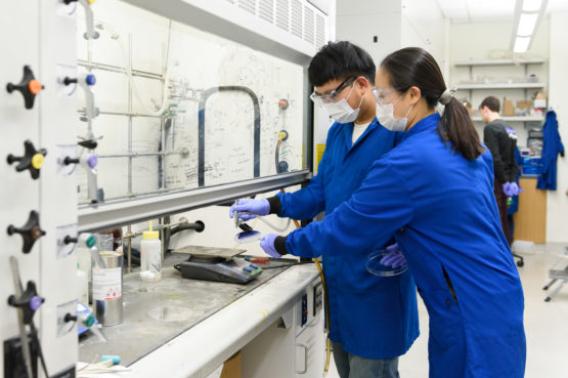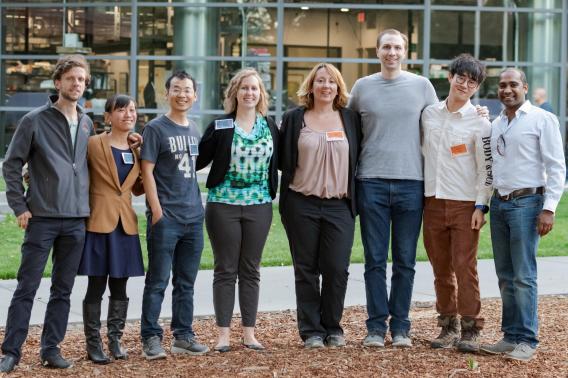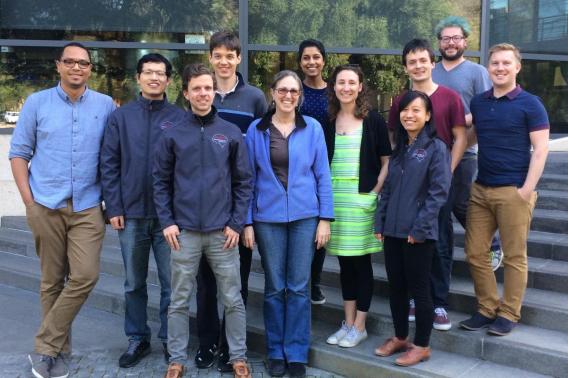Our postdoctoral scholars program provides research support and a community of mentors and peers to extraordinary Stanford postdocs advancing our understanding of the mind and brain in health and disease.
The Wu Tsai Neurosciences Institute's Postdoctoral Scholar Awards support innovative, collaborative and creative postdoctoral researchers from across Stanford who are pursuing novel, multi-disciplinary approaches to understanding the workings of the mind and brain. In addition to receiving research funding, scholars meet regularly for workshops, journal clubs and other activities that allow them to learn from one another’s varied research and personal backgrounds and establish community and collaborations. These Interdisciplinary Postdocs and Brain Resilience Scholars will advance our knowledge of brain health and aging.
Program Tracks
Interdisciplinary Postdoctoral Scholar Award
Since 2015, the Wu Tsai Neuro's Interdisciplinary Scholars track has supported innovative young researchers with backgrounds in basic and clinical neurosciences, biomedical sciences, physical sciences, social sciences, engineering, education, law, business and humanities who are engaged in cutting edge interdisciplinary research in the neurosciences, broadly defined.
Brain Resilience Postdoctoral Scholar Award
Since 2023, the Brain Resilience Postdoctoral Scholars award of the Knight Initiative for Brain Resilience supports trainees generating paradigm-shifting insights on the mechanisms of neurodegeneration and how to maintain brain resilience into old age.
Application
This program is open to current Stanford postdocs. Our next postdoc applications will open in Winter Quarter 2024.
Funded Interdisciplinary Postdoctoral Scholar projects
Restoring vision with epiretinal prostheses
Millions of people are blind, yet we still don’t have the technology to satisfactorily restore vision. I aim to create a prosthetic device to do so. This device can be implanted in the eyes of a blind patient, resting on a tissue layer called the retina.
Investigation of synapse formation by novel nanoscale imaging techniques
Synaptic junctions linking individual neurons constitute the fundamental building blocks of our brain. Understanding their inner working is crucial to unravel the mechanisms by which our brain processes information. However, imaging structures at a relevant sub-synaptic level is challenging and has often hampered advances in neuroscience.
Forces driving myelin wrapping In oligodendrocytes
Dr. Miguel Garcia believes that identifying the mechanism of myelin wrapping is important in understanding neural development and is a critical first step towards creating much needed therapeutic approaches to stimulate remyelination in patients with demyelinating diseases.
Next-generation brain imaging in freely moving animals
Calcium imaging in freely behaving animals allows for the tracking of neuronal activity under approximately normal behavioral conditions. However, the slow response time of calcium imaging inhibits high resolution voltage and temporal measurements. To address this issue, modern molecular tools have been developed to optically report the high-speed dynamics of neurons more accurately.
Funded Brain Resilience Postdoctoral Scholar projects
Elucidating the role of alternative polyadenylation in amyotrophic lateral sclerosis (ALS) and frontotemporal dementia (FTD)
With an aging population, neurodegenerative disorders contribute increasingly to our global health burden with no cure or effective treatments. Amyotrophic lateral sclerosis (ALS) and frontotemporal dementia (FTD) are two neurodegenerative disorders that are distinct in clinical presentation (ALS impairs movement/breathing, whereas FTD impairs behavior/cognition).
Rejuvenating sleep to enhance brain resilience with age
Sleep is a critical behavioral state that fulfills essential needs for health, including clearing waste products (e.g., protein aggregates) from the brain. But sleep is not everlasting. As humans age, sleep quality strikingly deteriorates, and this decline is associated with dementias (e.g., Alzheimer’s disease).
Our Model
This program awards two years of fellowship funding and is pleased to provide parental leave. Postdoctoral scholars also receive $5,000 of discretionary research funds annually.
Mentorship
The program provides scientific and career-growth opportunities and guidance under the leadership of program co-directors and faculty mentors Professors Miriam Goodman and Liqun Luo. Scholars meet monthly with their cohort and program faculty mentors to share ideas and discuss approaches to scientific and career challenges, visit each other’s labs to learn about different research techniques and areas of study, and practice communicating their research to scientific and general audiences.
In addition, Brain Resilience Postdoctoral Scholars attend events and seminars hosted by the Knight Initiative for Brain Resilience, and are stewarded by Knight Initiative Associate Director Natasha Hussain and faculty mentor Elizabeth Mormino to learn from one another and build community around the topic of neurodegeneration and brain resilience.
Diversity
The Wu Tsai Neurosciences Institute Postdoctoral program brings together cohorts of postdocs representing the broad range of demographic, experiential and scientific diversity. Women and postdocs from groups underrepresented in the neurosciences are strongly encouraged to apply.
Learn more

Application and Eligibility Details
Carefully review the detailed information below if you are interested in applying to the Interdisciplinary Postdoctoral Scholars track or the Brain Resilience Postdoctoral Scholars track of the program.




